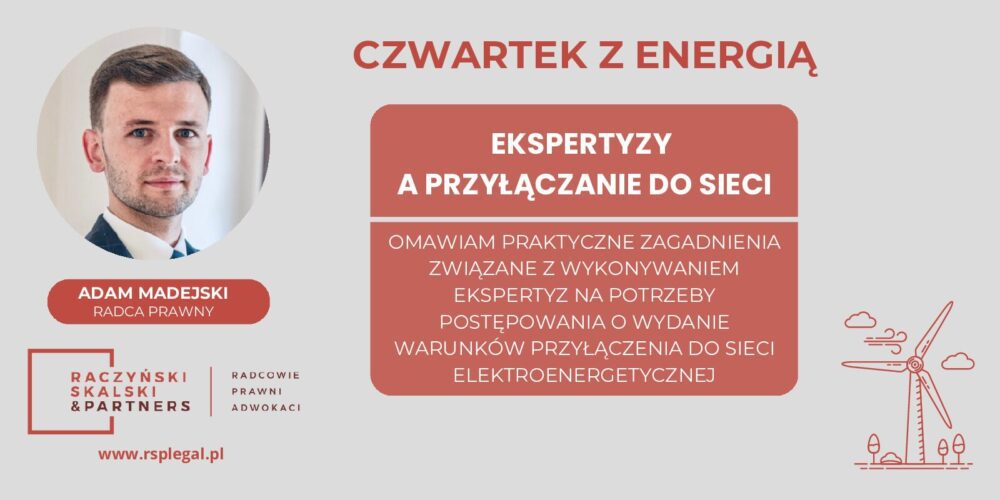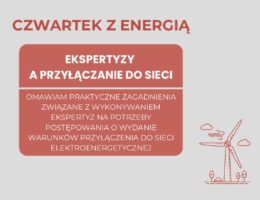One of the essential elements in the process of connecting a generating source to the medium- or high-voltage grid is the preparation of an expert report to assess the impact of the source’s operation on the power system. This obligation, from which the energy law provides for certain exceptions, is motivated by the need to determine whether the operation of the generating unit in a broader context will not cause above-normal disturbances in the operation of the power grid. Here are the highlights of the rules for preparing expert reports in the grid connection process.
1. Source of obligation and general rules
The obligation regarding the preparation of expert reports stems from Article 7, paragraph 8e of the Energy Law – it applies to any installation, device or network that is directly connected to an electricity network with a voltage of 1 kV or higher. However, the same provision indicates exceptions to the obligation, which apply to:
-
-
- generation sources with an installed capacity of less than 2 MW,
- end-user facilities whose connection capacity is less than 5 MW,
- electricity storage facilities whose installed capacity is less than 2 MW,
- combined generating unit and energy storage, if their combined capacity is less than 2 MW,
- the connected installation of the end customer, part of which will be an electricity storage facility, provided that the total installed capacity of this storage facility and the connection capacity of the end customer’s installation is not greater than 5 MW.
-
The distribution system operator to whose grid the connection is to be made is responsible for preparing the expert report (Article 7, paragraph 8ea of the Energy Law), while the cost of its preparation is included in the connection fee (Article 7, paragraph 8f of the Energy Law). The provisions of the Energy Law do not stipulate either specific or general criteria that an expert report should meet, or how long it should take to prepare it. Neither are the rules regulated on which the entity applying for connection could influence the process of preparing such an expert report or raise objections to its results. The only regulation in this regard is contained in the Decree of the Minister of Climate and Environment of March 22, 2023 on detailed conditions for the operation of the electric power system, where § 4(6) indicates that the scope and conditions for the preparation of expert reports shall be agreed by the distribution system operator with the transmission system operator, while § 7 of this paragraph indicates that at the request of the applicant, the power company shall provide information on the criteria for the preparation of the expert report and the results of the expert report.
In the context of the voltage of the grid to which the connection is made, for lines with a voltage of 110 kV or higher, the Polish Power Grid has developed the so-called ZIWWE, or terms and conditions for expert opinions. These documents are available on PSE website. For the medium-voltage grid, such rules are most often included in general-purpose documents published by distribution system operators on broadly defined rules and criteria for connection to the power grid. However, these documents still do not provide connection applicants with a transparent evaluation framework and means by which to establish detailed justification for the results of a given expert opinion.
2. Controversy
The biggest controversy in the process of preparing expert reports is the fact that the distribution system operator is actually responsible for their preparation, while at the same time there are no transparent criteria for the principles of creating such documents. This was pointed out by the Supreme Audit Office, which in its report on the state of the network and operation of the distribution system indicated: The findings of the audit indicate that the provisions of the Energy Law do not give the ERO President the possibility of ordering the preparation of an expert report for the purpose of processing disputes. In the procedure for considering applications, distribution system operators commissioned and used the results of expert reports on the possibilities and conditions for connection prepared at their request. The ERO President was guided by the results of these expert reports when issuing decisions in the proceedings. According to the NIK, the expert report should be prepared by an independent entity selected by the ERO President. Otherwise, the expert report prepared on behalf of an entity that is a party to the proceedings and is interested in upholding its own decision is relevant evidence in the case.
It is impossible to deny the validity of the above position. In the process of creating the expert report, which, after all, has a fundamental impact on the possibility of connecting the unit to the power grid, the role of the applicant was reduced to a passive observer. Such a solution negatively affects the entire process, since even questioning the findings of the expert report is possible only at the stage of a dispute with the ERO President, while such a possibility – in order to streamline the connection procedure – should take place even at the stage of considering the application for the issuance of connection conditions.
Furthermore, doubts are raised by the fact that the so-called System Ordinance contains residual regulations on expertise, while this legal act seems to be the right place to include a general framework on the rules for preparing expertise for both high and medium voltage networks. As a result, such rules are developed in-house by power system operators, which from a system perspective raises concerns about their objectivity or reliability.
3. Postulates
The most frequently raised demands to the legislator are to give the process of issuing expert reports a clear legal framework. Only then will the course of the proceedings for the issuance of connection conditions – where the expertise is mandatory – be transparent. Such a measure would certainly also translate into a reduction in disputes between generators and system operators, since the determination of doubts and objections to the unit’s impact on system operation would be possible under certain rules while still in the procedure for issuing connection conditions.
As has already been pointed out, given the changing technical conditions and dynamic development of the grid, the matter of the rules for the exercise of expert opinions can be successfully included in the regulation of the system regulation. This would save the need to amend the Energy Law and allow the regulations to follow the current market situation.



